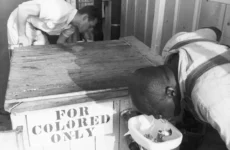DPW participated in environmental degradation at unlicensed dump
by Matthew Ricciazzi
Since The Reporter broke a story about illegal dumping at a city-operated composting facility last week, the State’s Department of Environmental Conservation (DEC) has launched an investigation into the illegal dumping. On the same day, last Thursday, Department of Public Works supervisors instructed employees to put sweeper dirt in dumpsters rather than atop mounds already at the composting site.
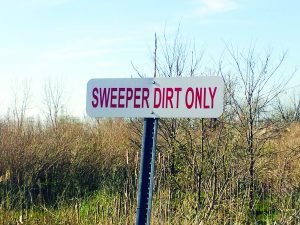
Street cleaning teams regularly dump sweeper dirt at the corner of North Avenue and 11th Street as a temporary transport site. Sources say that those piles are sometimes left for months.
When DEC officials arrived at the site on Monday, sources say, they watched a city dump truck as it unloaded more street sweeper dirt at the site. Sweeper dirt is collected by DPW’s street cleaning teams, collecting loose blacktop, litter, needles, drug bags, and other debris left discarded on the street. Those DEC officials then collected samples on the site, though they did not speak with the driver of the dump truck.
Last week, DPW Director John Caso claimed that city street cleaning crews were not dumping sweeper dirt at the composting site and, that if they were doing it, that he would have it stopped. But signage posted on site by the city’s sign shop indicates that the city has been well aware of the longstanding practice. One sign reads “Sweeper Dirt Only,” another reads “Leaves Only,” and another reads “No Dumping.”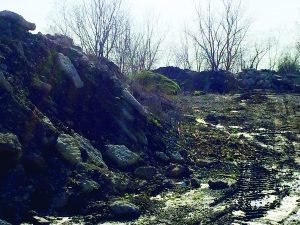
Mayor Paul Dyster says that the composting site is supposed to be used only for organics like leaves, trees, grass, and stumps.
“DEC has been on the site in the last few days,” Dyster says. “We appear to not be handling sweeper dirt properly, on the assumption that it’s just dirt.”
“We’re talking with DEC now,” explains Dyster. “Sweeper dirt has to be kept segregated. Now, we’re talking about putting it into dumpsters then bringing it to Modern [landfill].”
“DEC takes every tip about potential contamination seriously, and our law enforcement professionals work quickly and thoroughly to investigate any we receive,” says Megan Gollwitzer, an official with the agency’s regional office. “DEC is aware of nearby registered solid waste facilities and regulates landfills in NYS under the State’s Solid Waste Management Regulations (6 NYCRR Part 360).”
“However, DEC is not aware of activities in the location described,” she explains. “DEC will investigate the matter and will pursue appropriate enforcement action, if warranted.”
They describe a situation in recent months when a contractor was seen illegally dumping “smelly black dirt” at the site. The contactor was approached by Mike Mills, the city officials who manages the compost site and a city recycling program. Mills, reportedly said, “don’t come back here again,” without enforcing city ordinances that would have required fines for illegal dumping.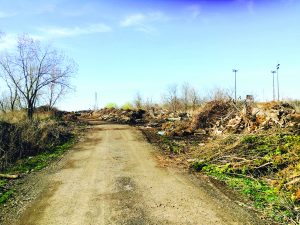
Meanwhile, near the corner of North Avenue and 11th Street, DPW has been dumping piles of sweeper dirt. Trucks regularly empty at that location. Sometimes piles are left there for months before being disposed. Jeff Smeal is the city official who manages DPW’s street cleaning teams. He did not return a phone call to his office.
“There have been illegal dumping problems along North Avenue,” Dyster concedes. “But we’re not aware of sweeper dirt there.”
Nina Manzare runs the city’s Clean Neighborhoods program and is responsible for enforcing ordinances for illegal dumping violations on both private and public property. When asked this week how much the fine for a violation would be, she responded, “I’m not sure.” She refused to say how many citations that her office issues in a year, instead directing questions to DPW Deputy Director Robert Spacone.
Manzare says that residents can acquire a free dump permit from DPW offices located at 1785 New Road with their driver’s license and proof of residency. With that permit, the resident can dump their garbage at Modern Landfill in Lewiston.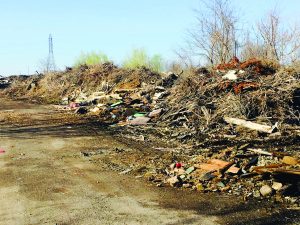
When asked if illegal dumping on the part of contractors looking to avoid costs associated with properly disposing construction debris, Mayor Paul Dyster concedes, “I’m afraid that might be true.”
“It’s a big, isolated area that is difficult to control,” Dyster explains. “It’s a 70-80 acre lot… there’s no security gate. We have periodically used cameras in the past.”
“When we’re done hashing it out with DEC we’re going to end up with permanent fencing around the site,” he postulates.


